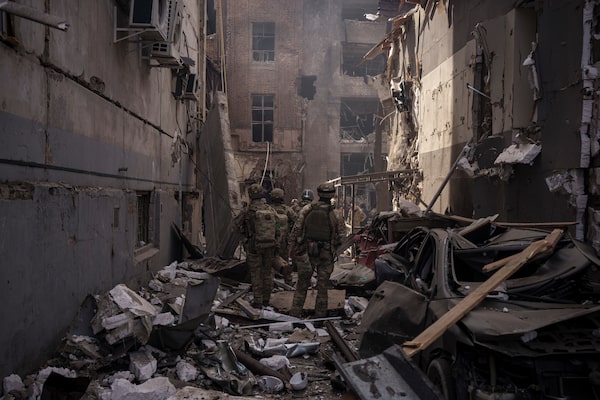
Ukrainian servicemen walk among debris of damaged buildings after a Russian attack in Kharkiv, Ukraine, on April 16.Felipe Dana/The Associated Press
With the 20-20 vision of hindsight, it’s clear that in the months and years prior to the Feb. 24 Russian invasion of Ukraine, NATO countries made one very big mistake. It was an act of omission, but a deliberate one. In different circumstances, facing a different adversary, maybe it would have been the right move. But in Ukraine, this Western mistake made the current war more likely, by leaving the aggressor relatively stronger than he might have been, and the intended victim weaker.
In a bid to avoid provoking Moscow or inflaming the conflict, many countries long declined to send weapons to Ukraine. For example, while members of the Canadian Armed Forces were allowed to train thousands of Ukrainian troops, Canada refused to export even small arms until Feb. 14 – less than two weeks before the Russian attack. Many European countries took a similar approach.
The United States for a time followed the same course, even after the 2014 Russian invasion of Crimea and Donbas. During the Trump administration, the Americans finally began exporting weapons, but until very recently they remained limited in quantity and type.
It was an attempt to prove to Russian President Vladimir Putin that the West had no aggressive designs against his country. It instead persuaded him that overthrowing the Kyiv government, and occupying Ukraine, would be an easy thing. Ours was not a policy of deterrence through strength. It is now clear that Mr. Putin understood it more as enticement through weakness.
Prior to the War of 1812, Thomas Jefferson said that conquering Canada would be “a mere matter of marching.” Moscow assumed something similar in Ukraine. Fortunately, that’s not how it’s gone. Instead of a cakewalk into Kyiv, the war has produced limited Russian advances in some places, defeat and retreat in others and tens of thousands of dead and wounded Russian soldiers.
I’m tired of hearing Russian propaganda repeated in the West
By accepting Ukrainian and Russian refugees, Canada can do good and do well
The reason things have been so much more difficult than expected for the invaders is due to the remarkable determination and skill of the Ukrainians. In the early days of the war, they made the most of what advanced weapons they had at hand, from a handful of Turkish drones to limited supplies of American and British anti-armour missiles.
But what if Ukraine, instead of facing a huge deficit in military resources, had been on a more even footing with Russia? What if the West had sent a lot more weapons – from tanks to fighter jets – long before Feb. 24? And what if Russia had been well aware of that?
Might Mr. Putin have been deterred? He would certainly have had to think more deeply about the likely cost of war, including the possibility of paying the highest price of all: defeat and downfall. Bullies pick fights they can win, not ones they know they’ll lose.
And even if he had not been deterred, war against a better-armed Ukraine would have gone worse for him than it already has.
The fate of Ukraine is now being decided not by diplomatic démarches, but on the battlefield. That’s why Western countries, having long hoped for some sort of negotiated solution, even after the invasion, are now racing to send ever greater quantities of weapons to Ukraine. (That includes Canada; after promising some of our military’s stocks of portable rocket launchers in the early days of the war, Ottawa this month budgeted another $500-million for arms to Ukraine.) For the first time, the Western shipping list includes heavy weapons, such as armoured vehicles and artillery.
It’s the right approach. But how differently might things have played out if Ukraine had received all these weapons in the years after the 2014 invasion, rather than in the weeks and months after the 2022 invasion?
It’s a reminder that diplomacy and deterrence are not antagonists. In the right hands, strength can make war less likely, not more so.
That holds lessons for Canada. Our armed forces are today woefully underprepared to deter, because they are woefully underarmed to fight. The Ukrainian military has capabilities – from advanced anti-tank weapons such as Javelin and NLAW to anti-aircraft missiles such as Stinger – the Canadian Army lacks.
Our troops are well trained. But their erstwhile Ukrainian students, however insufficiently equipped, are now better armed than their former teachers.
Keep your Opinions sharp and informed. Get the Opinion newsletter. Sign up today.